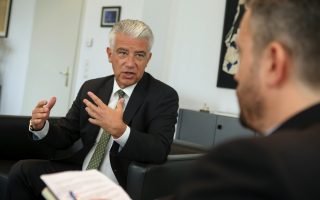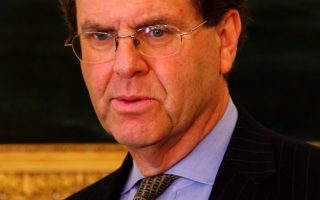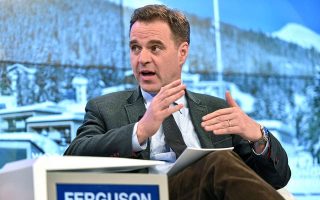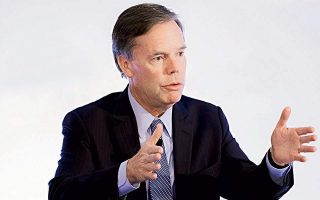Joseph Nye: The world needs a stronger and more effective Europe
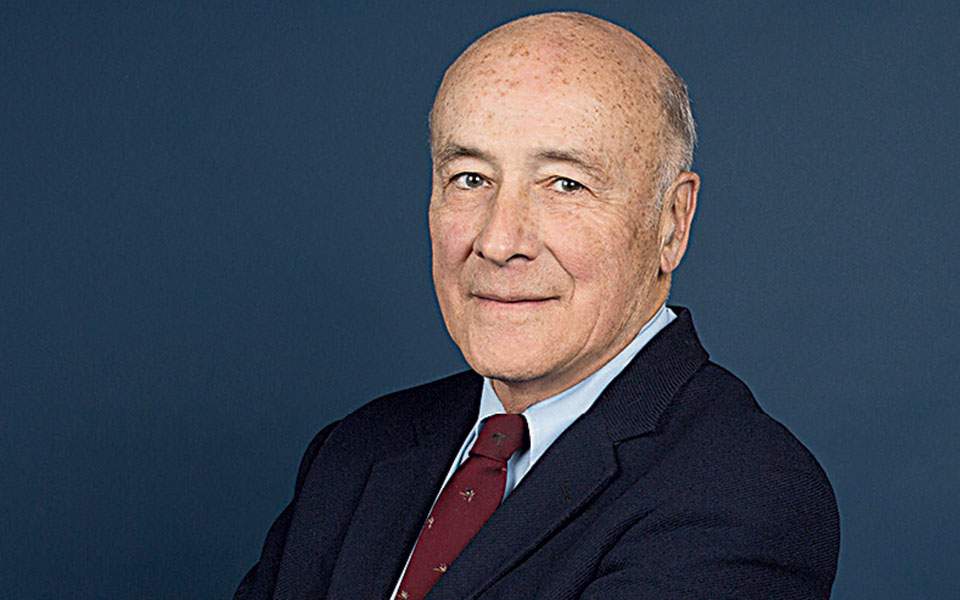
Professor Joseph Nye is one of the world’s most distinguished political scientists and thinkers and has made a considerable contribution to international relations in the last 50 years.
The former dean of the Kennedy School of Government at Harvard University, where he currently holds the position of University Distinguished Service Professor, Emeritus, has helped to shape the concept of complex interdependence between nations which states that national interest should be defined in broad terms.
Particularly for the US, it should combine “hard” and “soft” power in a form that can be called “smart power.” Professor Nye has had considerable influence in Washington on many successive administrations, and served as assistant secretary of defense for international security affairs during Bill Clinton’s first presidency.
In an interview with Kathimerini, he talks about his new book “Do Morals Matter?” and offers interesting insights into how the pandemic is shaping global governance and the balance of power.
Is the main takeaway from your new book that the US will remain the dominant power if it adheres to the kind of moral leadership offered by some presidents and avoids the examples of others?
American power will continue to rest on its hard economic and military power, but such hard power is reinforced by the soft power of attraction. A moral posture attracts others and contributes to a country’s soft power. The successful combination is what I call smart power. Every president must defend the national interest, but the moral question arises in whether he defines it narrowly or in a broad manner, which can include the interests of others. The earlier presidents did so, but [Donald] Trump takes a narrow approach.
So is moral leadership a wise blend of soft power and hard power – given that Franklin D. Roosevelt and certainly Harry S. Truman, apart from soft power policies (Marshall Plan), projected perhaps the most extreme forms of hard power in human history (atomic bomb)?
I discuss Truman and nuclear weapons in the book. He inherited the plans for using the new weapons at Hiroshima and Nagasaki, but he refused to allow the army to drop the third bomb. Five years later, when he was losing the Korean War, he resisted General MacArthur’s recommendation to drop 25 to 40 atomic bombs on Chinese cities because he did not want to kill so many innocent people. That moral decision prevented nuclear weapons from becoming normal weapons.
A Trump defender would say that Trump is more moral in the traditional sense than Clinton, George W. Bush and Barack Obama. Trump insists that allies should shoulder a fairer share of the NATO budget and has promised to pull the US out of costly wars. He complements that by setting clear red lines and illustrates that he means his threats (Iranian General Soleimani). What do you think about that? Does Trump deserve a little credit?
In the book, one of the rare good marks I give Trump is on his limits on the use of force. George W. Bush may have had more moral intentions with his freedom agenda, but his good intentions paved the path to hell in Iraq. That is why I argue in the book that we should not judge morality of a foreign policy on intentions alone, but also on the means that are used and the nature of the consequences.
On the other hand, Trump has mercilessly and tirelessly attacked all accepted notions of truth, facts, science, democracy, human rights, alliances, Americans of color, women and immigrants. If there’s a “Trumpian project,” it must be the redefinition of reality and morality according to values and principles adhered to by an electorate that always was “Trumpian” in character but could not influence accepted truths until Trump appeared. Where is the US and the world headed if Trump is re-elected?
Trump has shown less concern for morality than previous presidents, and polls show that American soft power has diminished since he became president. All presidents have told lies, but Trump is exceptional in the quantity. The result is that he has debased the currency of truth and trust and that has hurt the US. A different leader would define the national interest more broadly in a time of pandemic. If poor countries cannot manage the coronavirus, it becomes a reservoir that can overflow in future waves and hurt us. A massive plan to aid poor countries would be good for us and good for them; just as the Marshall Plan, which transferred 2 percent of American GDP, was good for the US and good for Europe at the same time.
According to Thucydides, it was the plague that weakened the beacon of democracy, Athens, and contributed to its defeat by authoritarian rival Sparta. Do you see any similarities between that and today, with the West and China?
Beware of oversimplified historical analogies. Historians believe that the plague killed a quarter of the population of Athens. That is not the case with the US or China. I think this pandemic has hurt the soft power of both countries, but I do not think it has changed the balance of power.
Despite the pandemic, the friction between Greece and Turkey continues to linger in the Aegean and Cyprus. What would be the end game? Would America be forced to choose a side? Is the Alliance ready to lose Turkey?
The US has consistently tried to manage the friction between Greece and Turkey over the years, thus far successfully. I do not think the prospects for conflict management would be improved if Turkey left NATO. That would not be in the interests of Greece or the US.
French President Emmanuel Macron told the Financial Times in an interview that the European Union is facing a moment of truth, saying that if it cannot decide it is “more than an economic market,” then “the populists will win in Italy, in Spain, perhaps in France and elsewhere.” But how about populists in Germany? Do we face the impossible choice between populist victories in Italy and France on the one hand and Germany and the Netherlands on the other?
Despite its problems, the European Union has been a historic success. It would be a tragedy if it were badly weakened by this pandemic. The world needs a stronger and more effective Europe and that will require more compromise between its north and south.
